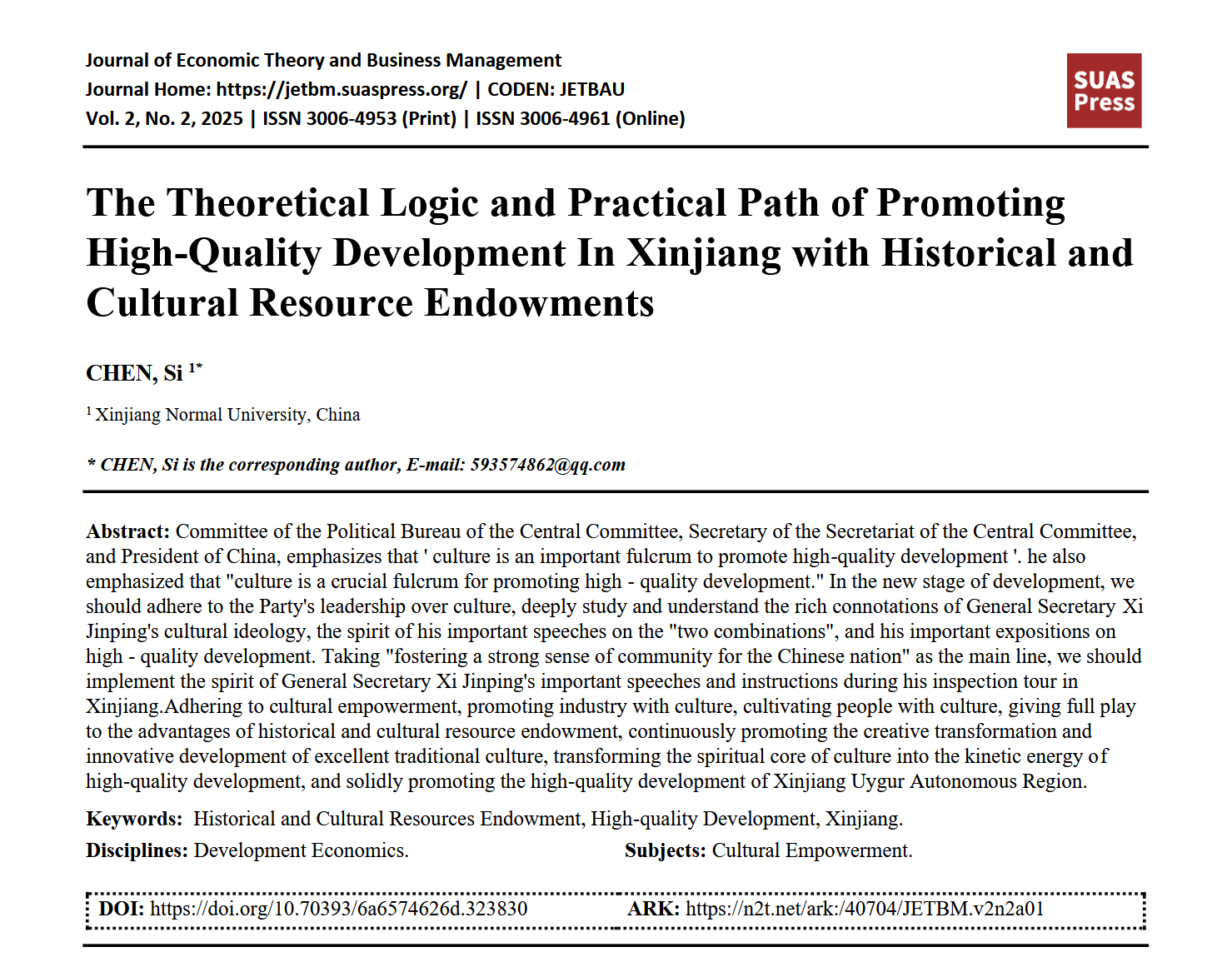The Theoretical Logic and Practical Path of Promoting High-Quality Development In Xinjiang with Historical and Cultural Resource Endowments
DOI:
https://doi.org/10.70393/6a6574626d.323830ARK:
https://n2t.net/ark:/40704/JETBM.v2n2a01Disciplines:
Development EconomicsSubjects:
Cultural EmpowermentReferences:
8Keywords:
Historical and Cultural Resources Endowment, High-quality Development, XinjiangAbstract
Committee of the Political Bureau of the Central Committee, Secretary of the Secretariat of the Central Committee, and President of China, emphasizes that ' culture is an important fulcrum to promote high-quality development '. he also emphasized that "culture is a crucial fulcrum for promoting high - quality development." In the new stage of development, we should adhere to the Party's leadership over culture, deeply study and understand the rich connotations of General Secretary Xi Jinping's cultural ideology, the spirit of his important speeches on the "two combinations", and his important expositions on high - quality development. Taking "fostering a strong sense of community for the Chinese nation" as the main line, we should implement the spirit of General Secretary Xi Jinping's important speeches and instructions during his inspection tour in Xinjiang.Adhering to cultural empowerment, promoting industry with culture, cultivating people with culture, giving full play to the advantages of historical and cultural resource endowment, continuously promoting the creative transformation and innovative development of excellent traditional culture, transforming the spiritual core of culture into the kinetic energy of high-quality development, and solidly promoting the high-quality development of Xinjiang Uygur Autonomous Region.
References
[1] Xi, J. P. (2020). Speech at the symposium of experts in education, culture, health, and sports. People’s Publishing House.
[2] Yan, Q., & Guo, Y. C. (2024). Reflections on constructing the theoretical system of the Chinese national community. Northwest Journal of Ethnology, (2).
[3] Pu, Y. (2022). Differentiation of ethnic village tourism under cultural capital perspective: A case study of Western Hunan. Journal of Jishou University (Social Sciences Edition), 43(4), 148-160.
[4] Fang, S. (2019). Cultural border defense strategy in the context of border governance modernization. Thinking Front, 44(6).
[5] Li, G. X. (2023). Cultural resources empowering rural revitalization: Internal mechanisms and practical pathways - A case study of "X Village" in ethnic regions of Jilin Province. Heilongjiang National Series, (5), 85-94.
[6] Liu, J. S. (2019). A study on international production capacity cooperation in the Belt and Road Initiative (Doctoral dissertation, Chinese Academy of Social Sciences).
[7] Xi, J. P. (2022). Hold high the great banner of socialism with Chinese characteristics and strive in unity to build a modern socialist country in all respects: Report to the 20th National Congress of the Communist Party of China. People's Publishing House.
[8] Guo, W. C. (2024). Cultural drivers of new quality productive forces: Towards a theoretical framework. Journal of Shandong University (Philosophy and Social Sciences), (4), 25-34.

Downloads
Published
How to Cite
Issue
Section
ARK
License
Copyright (c) 2025 The author retains copyright and grants the journal the right of first publication.

This work is licensed under a Creative Commons Attribution 4.0 International License.

















